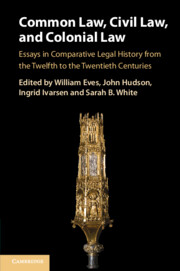Common Law, Civil Law, and Colonial Law
Common Law, Civil Law, and Colonial Law builds upon the legal historian F. W. Maitland’s famous observation that history involves comparison, and that those who ignore every system but their own ‘hardly came in sight of the idea of legal history’. The extensive introduction addresses the intellectual challenges posed by comparative approaches to legal history. This is followed by twelve essays derived from papers delivered at the 24th British Legal History Conference. These essays explore patterns in legal norms, processes, and practice across an exceptionally broad chronological and geographical range. Carefully selected to provide a network of inter-connections, they contribute to our better understanding of legal history by combining depth of analysis with historical contextualization. This title is also available as Open Access on Cambridge Core.
William Eves is a Research Fellow at the University of St Andrews. He has published on law and legal procedure in England during the twelfth and thirteenth centuries.
John Hudson is Professor of Legal History at the University of St Andrews and an L. Bates Lea Global Law Professor at Michigan Law. His books include The Formation of the English Common Law (expanded edn., 2017) and The Oxford History of the Laws of England, II: 871-1216 (2012). He is a Fellow of the British Academy.
Ingrid Ivarsen is a Junior Research Fellow at Emmanuel College, University of Cambridge. She has published on language and law in Anglo-Saxon England.
Sarah B. White is a Research Fellow at the University of St Andrews. She has published on ecclesiastical and legal history, specifically argument and procedure, in England in the twelfth and thirteenth centuries. She is a Fellow of the Higher Education Academy.



